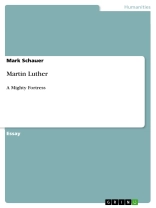Essay from the year 2008 in the subject Theology – Comparative Religion Studies, grade: A, Northern Arizona University, course: Reformation Europe, language: English, abstract: Martin Luther, the founder of Protestantism, is often considered the man who ended the Middle Ages and ushered in the Renaissance. Indeed, Luther’s great impulses, “a reverence for authority, a vehement spirit, a cutting wit, a special talent for obscenity, and, most important, a contempt for sinful human nature, coupled with a profound and melancholy awareness of the body’s fate at death, ” combine the best and worst of both epochs. (86) His attempt to roll Christian doctrine back to the days of St. Paul of Tarsus were viewed as heretical by the Church he had once fervently believed in. He eventually lambasted Jews and, especially, the Pope in the most vehement words and obscene imagery he could muster. He was a scriptural fundamentalist who believed bigamy and polygamy were acceptable in that they were not explicitly condemned in the Bible, yet felt adultery should be punished by death. Scholars consider his influence on the German language comparable to Shakespeare’s on English. His fight against the papacy inspired peasant revolts against the entire social order, which Luther explicitly rejected. He disbelieved in the geographic reality of hell and purgatory, but believed in the existence of witchcraft and sorcery. He was complex and contradictory, but profoundly influential.
O autorze
MA, English, Northern Arizona University, 2012.












